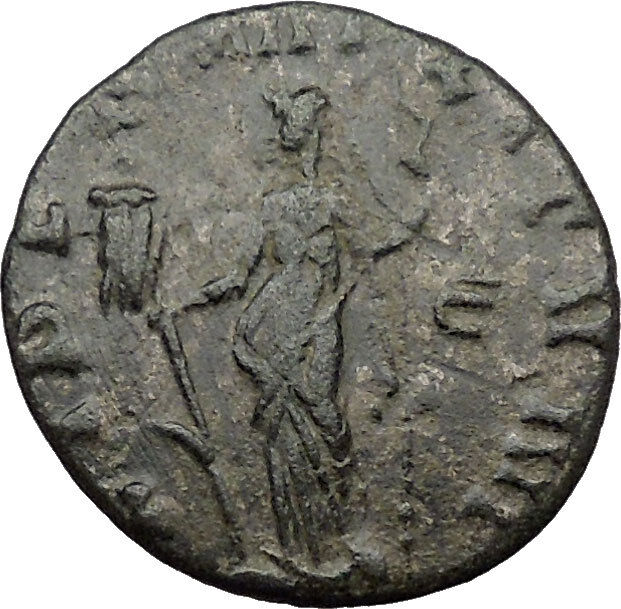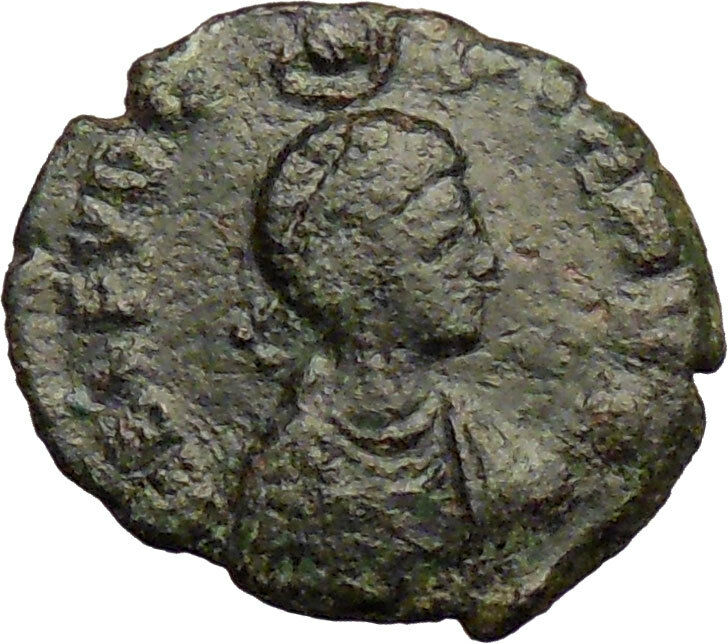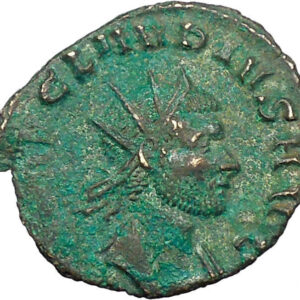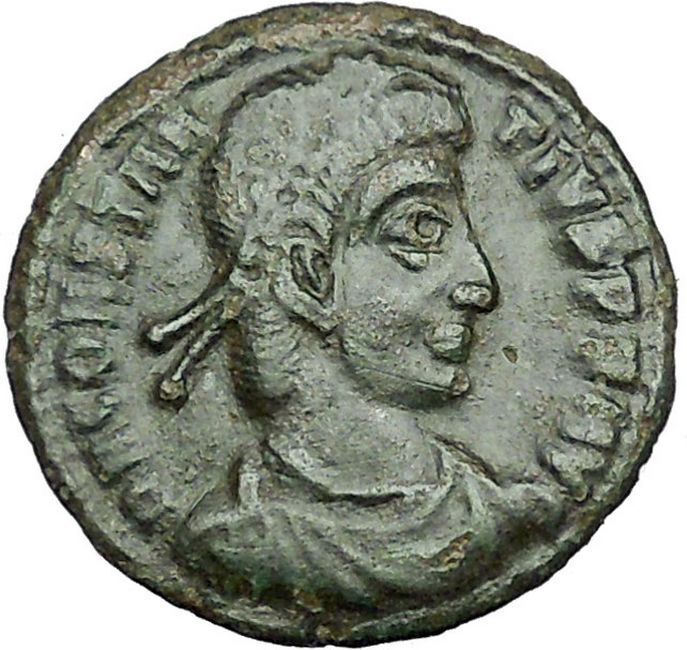|
Probus – Roman Emperor: 276-282 A.D.
Bronze Antoninianus 20mm (4.10 grams) Siscia mint, struck 281 A.D.
Reference: RIC V 644; Cohen 87
IMP C M AVR PROBVS AVG, radiate draped bust right.
CLEMENTIA
TEMP/XXI/B•, Emperor standing right, holding eagle-tipped scepter, receiving globe from Jupiter standing left, holding scepter.
You are bidding on the exact item pictured, provided with a Certificate of Authenticity and Lifetime Guarantee of Authenticity.
 Jupiter, called Zeus by the Greeks. Jupiter was originally an elemental divinity, and his name signifies the father or lord of heaven, being a contraction of Diovis pater, or Diespiter. Being the lord of heaven, he was worshipped as the god of rain, storms, thunder, and lightning, whence he had the epithets of Pluvius, Fulgurator, Tonitrualis, Tonans, and Fulminator. As the pebble or flint stone was regarded as the symbol of lightning, Jupiter was frequently represented with such a stone in his hand instead of a thunderbolt. In concluding a treaty, the Romans took the sacred symbols of Jupiter, viz. the sceptre and flint stone, together with some grass from his temple, and the oath taken on such an occasion was expressed by per Jovem Lapidem jurare. In consequence of his possessing such powers over the elements, and especially of his always having the thunderbolt at his command, he was regarded as the highest and most powerful among the gods. Hence he is called the Best and Most High (Optimus Maximus). His temple at Rome stood on the lofty hill of the Capitol, whence he derived the surnames of Capitolinus and Tarpeius. He was regarded as the special protector of Rome. As such he was worshipped by the consuls on entering upon their office ; and the triumph of a victorious general was a solemn procession to his temple. He therefore bore the surnames of Imperator, Victor, Invictus, Stator, Opihdus, Feretrius, Praedator, Triumphator, and the like. Under all these surnames he had temples or statues at Rome ; and 2 temples, viz. those of Jupiter Stator and of Jupiter Feretrius, were believed to have been built in the time of Romulus. Under the name of Jupiter Capitolinus, he presided over the great Roman games ; and under the name of Jupiter Latialis or Latiaris, over the Feriae Latinae. Jupiter, according to the belief of the Romans, determined the course of all human affairs. He foresaw the future, and the events happening in it were the results of his will. He revealed the future to man through signs in the heavens and the flight of birds, which are hence called the messengers of Jupiter, while the god himself is designated as Prodigialis, that is, the sender of prodigies. For the same reason the god was invoked at the beginning of every undertaking, whether sacred or profane, together with Janus, who blessed the beginning itself. Jupiter was further regarded as the guardian of law, and as the protector of justice and virtue. He maintained the sanctity of an oath, and presided over all transactions which were based upon faithfulness and justice. Hence Fides was his companion on the Capitol, along with Victoria ; and hence a traitor to his country, and persons guilty of perjury, were thrown down from the Tarpeian rock. – As Jupiter was the lord of heaven, and consequently the prince of light, the white colour was sacred to him, white animals were sacrificed to him, his chariot was believed to be drawn by 4 white horses, his priests wore white caps, and the consuls were attired in white when they offered sacrifices in the Capitol the day they entered on their office. The worship of Jupiter at Rome was under the special care of the Flamen Dialis, who was the highest in rank of all the flamens. {The Romans, in their representations of the god, adopted the type of the Greek Zeus. Jupiter, called Zeus by the Greeks. Jupiter was originally an elemental divinity, and his name signifies the father or lord of heaven, being a contraction of Diovis pater, or Diespiter. Being the lord of heaven, he was worshipped as the god of rain, storms, thunder, and lightning, whence he had the epithets of Pluvius, Fulgurator, Tonitrualis, Tonans, and Fulminator. As the pebble or flint stone was regarded as the symbol of lightning, Jupiter was frequently represented with such a stone in his hand instead of a thunderbolt. In concluding a treaty, the Romans took the sacred symbols of Jupiter, viz. the sceptre and flint stone, together with some grass from his temple, and the oath taken on such an occasion was expressed by per Jovem Lapidem jurare. In consequence of his possessing such powers over the elements, and especially of his always having the thunderbolt at his command, he was regarded as the highest and most powerful among the gods. Hence he is called the Best and Most High (Optimus Maximus). His temple at Rome stood on the lofty hill of the Capitol, whence he derived the surnames of Capitolinus and Tarpeius. He was regarded as the special protector of Rome. As such he was worshipped by the consuls on entering upon their office ; and the triumph of a victorious general was a solemn procession to his temple. He therefore bore the surnames of Imperator, Victor, Invictus, Stator, Opihdus, Feretrius, Praedator, Triumphator, and the like. Under all these surnames he had temples or statues at Rome ; and 2 temples, viz. those of Jupiter Stator and of Jupiter Feretrius, were believed to have been built in the time of Romulus. Under the name of Jupiter Capitolinus, he presided over the great Roman games ; and under the name of Jupiter Latialis or Latiaris, over the Feriae Latinae. Jupiter, according to the belief of the Romans, determined the course of all human affairs. He foresaw the future, and the events happening in it were the results of his will. He revealed the future to man through signs in the heavens and the flight of birds, which are hence called the messengers of Jupiter, while the god himself is designated as Prodigialis, that is, the sender of prodigies. For the same reason the god was invoked at the beginning of every undertaking, whether sacred or profane, together with Janus, who blessed the beginning itself. Jupiter was further regarded as the guardian of law, and as the protector of justice and virtue. He maintained the sanctity of an oath, and presided over all transactions which were based upon faithfulness and justice. Hence Fides was his companion on the Capitol, along with Victoria ; and hence a traitor to his country, and persons guilty of perjury, were thrown down from the Tarpeian rock. – As Jupiter was the lord of heaven, and consequently the prince of light, the white colour was sacred to him, white animals were sacrificed to him, his chariot was believed to be drawn by 4 white horses, his priests wore white caps, and the consuls were attired in white when they offered sacrifices in the Capitol the day they entered on their office. The worship of Jupiter at Rome was under the special care of the Flamen Dialis, who was the highest in rank of all the flamens. {The Romans, in their representations of the god, adopted the type of the Greek Zeus.
 Probus (Latin: Marcus Aurelius Probus Augustus; c. 19 August 232 – September/October 282), was Roman Emperor from 276 to 282. Probus (Latin: Marcus Aurelius Probus Augustus; c. 19 August 232 – September/October 282), was Roman Emperor from 276 to 282.
During his reign, the Rhine and Danube frontier was strengthened after successful wars against several Germanic tribes such as the Goths, Alamanni, Longiones, Franks, Burgundians, and Vandals. The Agri Decumates and much of the Limes Germanicus in Germania Superior were officially abandoned during his reign, with the Romans withdrawing to the Rhine and Danube rivers.
Early life
Born in 232 in Sirmium (modern day Sremska Mitrovica), Pannonia Inferior, the son of Dalmatius.
Military career
Probus entered the army around 250 upon reaching adulthood. Appointed as a military tribune by the emperor Valerian, he later distinguished himself under the emperors Aurelian and Tacitus. He was appointed governor of the East by Tacitus, whose death in 276 prompted Probus’ soldiers to proclaim him emperor.
Florianus, the half-brother of Tacitus, was also proclaimed successor by his soldiers, but he was killed after an indecisive campaign. Probus travelled west, defeating the Goths along the lower Danube in 277, and acquiring the title of Gothicus. His position as emperor was ratified by the Senate around this time.
As emperor

Sculpted head of Probus from Brescia in northern Italy.
In 278, Probus campaigned successfully in Gaul against the Alamanni and Longiones; both tribes had advanced through the Neckar valley and across the Rhine into Roman territory. Meanwhile, his generals defeated the Franks and these operations were directed to clearing Gaul of Germanic invaders (Franks and Burgundians), allowing Probus to adopt the titles of Gothicus Maximus and Germanicus Maximus.
One of his principles was never to allow the soldiers to be idle, and to employ them in time of peace on useful works, such as the planting of vineyards in Gaul, Pannonia and other districts, in order to restart the economy in these devastated lands. Of a greater and more lasting significance, Probus began the strategy of settling the Germanic tribes in the devastated provinces of the empire.
In 279-280, Probus was, according to Zosimus, in Raetia, Illyricum and Lycia, where he fought the Vandals. In the same years, Probus’ generals defeated the Blemmyes in Egypt. Probus then ordered the reconstruction of bridges and canals along the Nile, where the production of grain for the Empire was centered.
In 280-281, Probus put down three usurpers, Julius Saturninus, Proculus and Bonosus. The extent of these revolts is not clear, but there are clues that they were not just local problems (an inscription with the name of Probus erased has been found as far as Spain). In 281, the emperor was in Rome, where he celebrated his triumph.
Probus was eager to start his eastern campaign, delayed by the revolts in the west. He left Rome in 282, travelling first towards Sirmium, his birth city.
Assassination
Different accounts of Probus’s death exist. According to Joannes Zonaras, the commander of the Praetorian Guard Marcus Aurelius Carus had been proclaimed, more or less unwillingly, emperor by his troops.
Probus sent some troops against the new usurper, but when those troops changed sides and supported Carus, Probus’ remaining soldiers assassinated him at Sirmium (September/October 282). According to other sources, however, Probus was killed by disgruntled soldiers, who rebelled against his orders to be employed for civic purposes, like draining marshes. Carus was proclaimed emperor after Probus’ death and avenged the murder of his predecessor.
|





 Jupiter, called Zeus by the Greeks. Jupiter was originally an elemental divinity, and his name signifies the father or lord of heaven, being a contraction of Diovis pater, or Diespiter. Being the lord of heaven, he was worshipped as the god of rain, storms, thunder, and lightning, whence he had the epithets of Pluvius, Fulgurator, Tonitrualis, Tonans, and Fulminator. As the pebble or flint stone was regarded as the symbol of lightning, Jupiter was frequently represented with such a stone in his hand instead of a thunderbolt. In concluding a treaty, the Romans took the sacred symbols of Jupiter, viz. the sceptre and flint stone, together with some grass from his temple, and the oath taken on such an occasion was expressed by per Jovem Lapidem jurare. In consequence of his possessing such powers over the elements, and especially of his always having the thunderbolt at his command, he was regarded as the highest and most powerful among the gods. Hence he is called the Best and Most High (Optimus Maximus). His temple at Rome stood on the lofty hill of the Capitol, whence he derived the surnames of Capitolinus and Tarpeius. He was regarded as the special protector of Rome. As such he was worshipped by the consuls on entering upon their office ; and the triumph of a victorious general was a solemn procession to his temple. He therefore bore the surnames of Imperator, Victor, Invictus, Stator, Opihdus, Feretrius, Praedator, Triumphator, and the like. Under all these surnames he had temples or statues at Rome ; and 2 temples, viz. those of Jupiter Stator and of Jupiter Feretrius, were believed to have been built in the time of Romulus. Under the name of Jupiter Capitolinus, he presided over the great Roman games ; and under the name of Jupiter Latialis or Latiaris, over the Feriae Latinae. Jupiter, according to the belief of the Romans, determined the course of all human affairs. He foresaw the future, and the events happening in it were the results of his will. He revealed the future to man through signs in the heavens and the flight of birds, which are hence called the messengers of Jupiter, while the god himself is designated as Prodigialis, that is, the sender of prodigies. For the same reason the god was invoked at the beginning of every undertaking, whether sacred or profane, together with Janus, who blessed the beginning itself. Jupiter was further regarded as the guardian of law, and as the protector of justice and virtue. He maintained the sanctity of an oath, and presided over all transactions which were based upon faithfulness and justice. Hence Fides was his companion on the Capitol, along with Victoria ; and hence a traitor to his country, and persons guilty of perjury, were thrown down from the Tarpeian rock. – As Jupiter was the lord of heaven, and consequently the prince of light, the white colour was sacred to him, white animals were sacrificed to him, his chariot was believed to be drawn by 4 white horses, his priests wore white caps, and the consuls were attired in white when they offered sacrifices in the Capitol the day they entered on their office. The worship of Jupiter at Rome was under the special care of the Flamen Dialis, who was the highest in rank of all the flamens. {The Romans, in their representations of the god, adopted the type of the Greek Zeus.
Jupiter, called Zeus by the Greeks. Jupiter was originally an elemental divinity, and his name signifies the father or lord of heaven, being a contraction of Diovis pater, or Diespiter. Being the lord of heaven, he was worshipped as the god of rain, storms, thunder, and lightning, whence he had the epithets of Pluvius, Fulgurator, Tonitrualis, Tonans, and Fulminator. As the pebble or flint stone was regarded as the symbol of lightning, Jupiter was frequently represented with such a stone in his hand instead of a thunderbolt. In concluding a treaty, the Romans took the sacred symbols of Jupiter, viz. the sceptre and flint stone, together with some grass from his temple, and the oath taken on such an occasion was expressed by per Jovem Lapidem jurare. In consequence of his possessing such powers over the elements, and especially of his always having the thunderbolt at his command, he was regarded as the highest and most powerful among the gods. Hence he is called the Best and Most High (Optimus Maximus). His temple at Rome stood on the lofty hill of the Capitol, whence he derived the surnames of Capitolinus and Tarpeius. He was regarded as the special protector of Rome. As such he was worshipped by the consuls on entering upon their office ; and the triumph of a victorious general was a solemn procession to his temple. He therefore bore the surnames of Imperator, Victor, Invictus, Stator, Opihdus, Feretrius, Praedator, Triumphator, and the like. Under all these surnames he had temples or statues at Rome ; and 2 temples, viz. those of Jupiter Stator and of Jupiter Feretrius, were believed to have been built in the time of Romulus. Under the name of Jupiter Capitolinus, he presided over the great Roman games ; and under the name of Jupiter Latialis or Latiaris, over the Feriae Latinae. Jupiter, according to the belief of the Romans, determined the course of all human affairs. He foresaw the future, and the events happening in it were the results of his will. He revealed the future to man through signs in the heavens and the flight of birds, which are hence called the messengers of Jupiter, while the god himself is designated as Prodigialis, that is, the sender of prodigies. For the same reason the god was invoked at the beginning of every undertaking, whether sacred or profane, together with Janus, who blessed the beginning itself. Jupiter was further regarded as the guardian of law, and as the protector of justice and virtue. He maintained the sanctity of an oath, and presided over all transactions which were based upon faithfulness and justice. Hence Fides was his companion on the Capitol, along with Victoria ; and hence a traitor to his country, and persons guilty of perjury, were thrown down from the Tarpeian rock. – As Jupiter was the lord of heaven, and consequently the prince of light, the white colour was sacred to him, white animals were sacrificed to him, his chariot was believed to be drawn by 4 white horses, his priests wore white caps, and the consuls were attired in white when they offered sacrifices in the Capitol the day they entered on their office. The worship of Jupiter at Rome was under the special care of the Flamen Dialis, who was the highest in rank of all the flamens. {The Romans, in their representations of the god, adopted the type of the Greek Zeus. Probus (Latin: Marcus Aurelius Probus Augustus; c. 19 August 232 – September/October 282), was Roman Emperor from 276 to 282.
Probus (Latin: Marcus Aurelius Probus Augustus; c. 19 August 232 – September/October 282), was Roman Emperor from 276 to 282.





